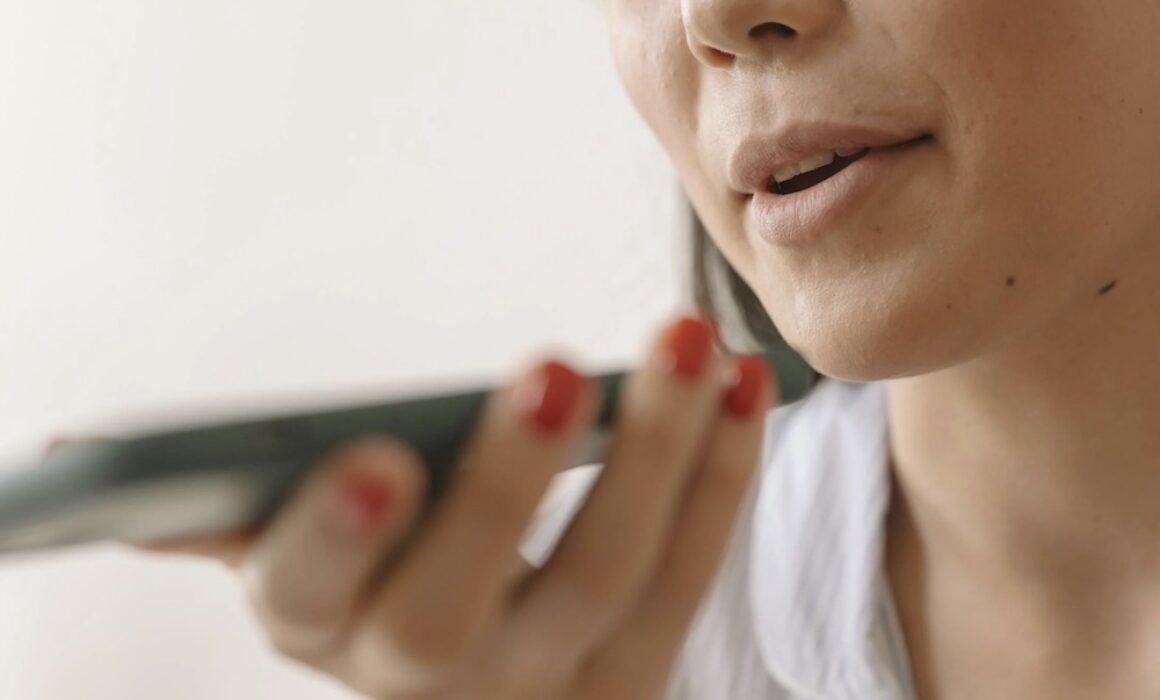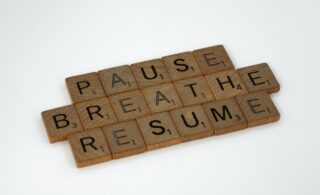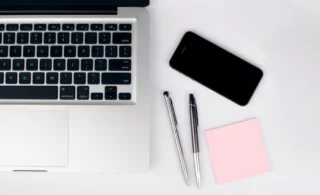
Friendships are often impacted by a cancer diagnosis and in this article Barbara, a wellness coach, talks through ways in which you can come to terms and deal with some upsetting ways in which your friendships may have changed since you were diagnosed with cancer. Using a case study from a session with one of her clients, Barbara takes you through some simple strategies to help you make sense of, and come to terms with, these changes.
By Barbara Babcock
Changes to your friendships after cancer may be one of the more unexpected changes you have had to deal with. You’ve learned that cancer impacts so much in your life, but this too? Your friends have been your go-to people for so much: laughs, fun, a sounding board, advice, support, compliments, a hug when things aren’t going great, an emergency babysitter, their children play with your children and so much more.
You and your mates are a tribe. You know where you belong.
But cancer can change all that.
It can feel awkward when a friend asks, ‘Are you back to normal now?’ You respond, ‘Not really,’ and your friend goes, ‘Oh right,’ then changes the subject. You thought you could be honest with this friend.
It can feel very upsetting to not be invited to the girls’ dinner out on a Friday night. To hear a friend say she doesn’t have time to talk.
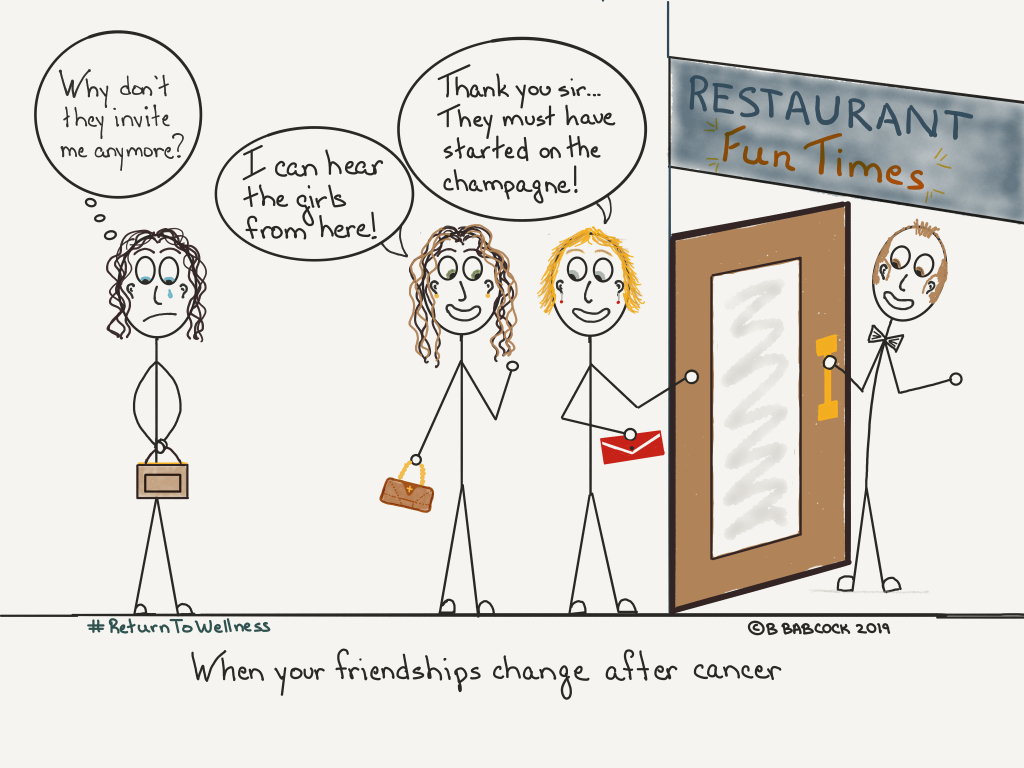
This is a common issue for many women who’ve had cancer. And it’s hard and confusing to deal with.
Cheryl’s friendships changed after cancer and she was finding it difficult to accept
Cheryl is in her early 40’s, has been treated for breast cancer, is married and has three children. Since her cancer treatment ended six months ago, Cheryl has found it difficult to deal with the changes in her friendships.
In this case study, I share key highlights from the session which led to the change Cheryl wanted for herself.
What Cheryl wanted
In our coaching session, Cheryl’s goal was to gain clarity regarding the changes in a key friendship group and advice on how to deal with them. She wanted two things:
- Clarity on what these changes meant
- Strategies to deal with the changes
Cheryl explained the changes she’s noticed with a group of close friends whom she’s known for a number of years and who, throughout her cancer treatment, were very supportive. She said that getting together one-on-one with them is good, but when they plan a group activity like a party or a dinner out, she isn’t always invited. When Cheryl does go out with them, her friends like to drink and the fun centres around alcohol. But since cancer, Cheryl no longer drinks much and she often feels isolated and on the edge of the group.
So how do you make sense of these changes to your friendships after cancer?
Listen to what you say and how you say it
Cheryl spoke about how left out she felt when her friends don’t invite her to group dinners and activities. I noticed she often used language, ‘They make me feel left out. They make me sad.’ Underpinning Chery’s questions was the assumption that she did something wrong and she was not worthy in relationship to these women.
As a coach, reflecting back to the client how they use language and assumptions underpinning what they say can raise their awareness of how they are thinking and feeling about an issue, and how that may be contributing to their distress. But also acknowledging the feelings underlying what the client is saying – how upset Cheryl was. Here’s how I did that with Cheryl.
Take your power back
I reflected word-for-word what Cheryl said back to her and explained what that language can mean.
You often hear people saying: ‘They make me feel… she/he made me feel…’
There is something subtle happening when you speak this way. Let me show you…
Say to yourself: They make me feel sad.
How exactly did they make you feel sad?
Did they tell you to feel sad? Did they hold you down until you felt sad? No, they didn’t. (I’m exaggerating here.)
But did they do something, and you felt sad in response to their actions? Yes. And feeling sad is a normal and valid response on your part.
When you say, ‘They make me feel…’, you are giving your control for how you feel about an issue to others. This is known as having an external locus of control. It’s a subtle way of giving your personal power away to others.
So, I asked Cheryl to say instead: ‘When they plan a weekend away or a dinner out and do not invite me, I feel excluded and sad.’
The difference here is that when you start your sentences with ‘I feel’ you are owning your feelings in response to what someone did. You are exercising your internal locus of control. You are standing in your personal power.
When you do this, you are in a stronger place to recognise your needs and then take action to meet them: ‘Ok, I feel excluded and sad. What do I want to do about that?’
This was a powerful realisation for Cheryl. She had found a way to take her power back and feel more in control regarding this issue.
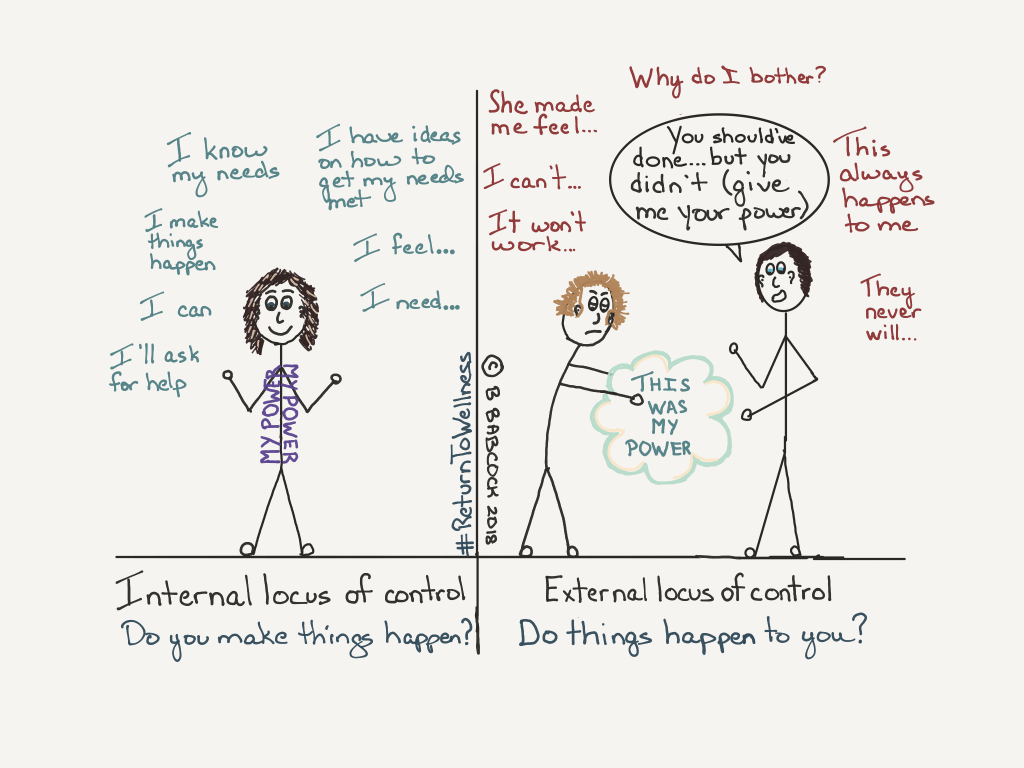
Discover your needs in relationships with others
Cheryl and I talked about how relationships change, and the needs we have from our relationships can change. I talked about the balance of give and take which exists in relationships (or not).
To help Cheryl get a deeper sense of her needs in relationship to her friends and her friends’ potential needs, I asked Cheryl if she wanted to experiment with an approach that entails setting up a visual map of her issue. I explained how seeing our issue mapped out visually can help us realise things we hadn’t seen before and that this approach is called Systemic Constellations or Family Constellations.
How Systemic Constellations can help you discover your needs
Cheryl was willing, so I had her split a piece of paper into five pieces and assign a piece of paper to each of her friends and herself. Each piece of paper had become a ‘representative’ for the person.
I asked her to draw an arrow on each piece of paper to represent the direction the representative would be facing.
I then asked her to arrange the pieces of papers into the configuration that represents how the web of relationships feels at present for Cheryl. This configuration is known as a ‘constellation’.
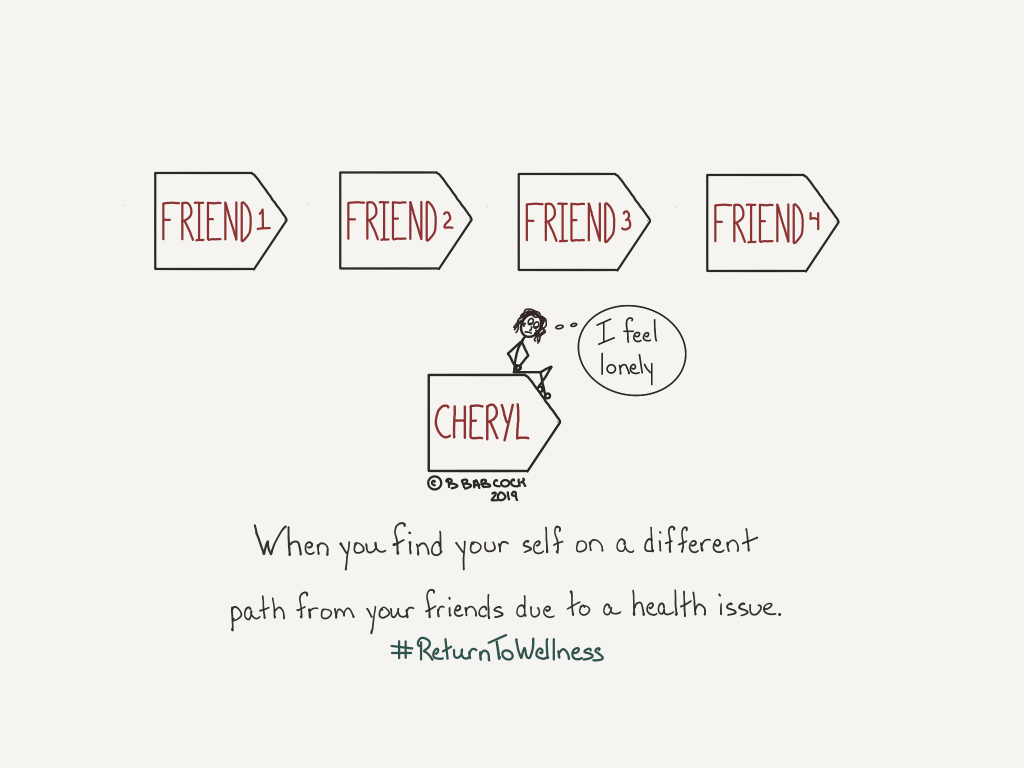
Looking at the constellation that Cheryl set her pieces of paper into, Cheryl and I noticed how she and her friends were all facing the same direction, looking into the future, but separated. Cheryl said it felt like they were on different paths.
Cheryl spoke a lot about one friend in particular – the friend who helped Cheryl a lot during her treatment but since she has been cancer free, this friend hasn’t interacted to the degree she did before Cheryl’s diagnosis and treatment.
I asked Cheryl to move her representative so it was facing this friend and tell this friend how she felt about being excluded.
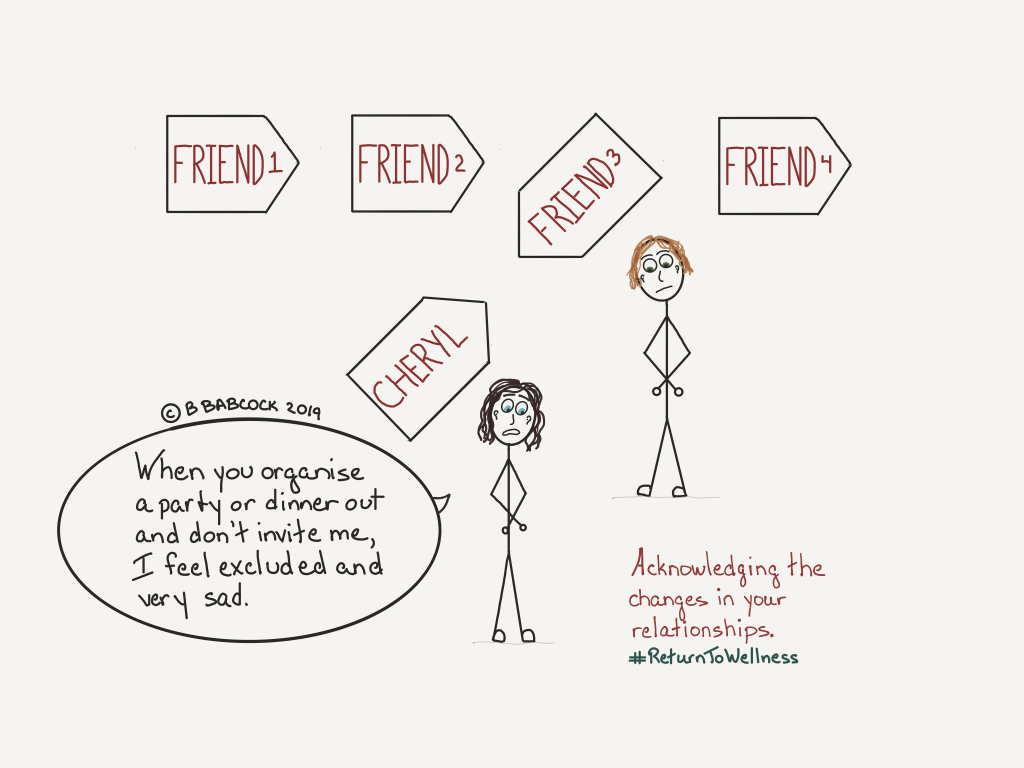
Cheryl said she felt relief at saying that sentence out loud. Even though her friend wasn’t actually present, saying how she felt out loud in front of another was a heartfelt acknowledgement of her situation and feelings about it. It was also an acknowledgement of her need for belonging and the changes of giving and taking in the relationship.
Discover what other people’s needs are in relation to you
There is a way you can start to discover another person’s potential needs in relation to you. To do that, you stand in their shoes. Which is a useful life skill you can develop. Here is how Cheryl and I did that using the Systemic Constellations approach.
I asked Cheryl to stand in for her friend and I would stand in for her.
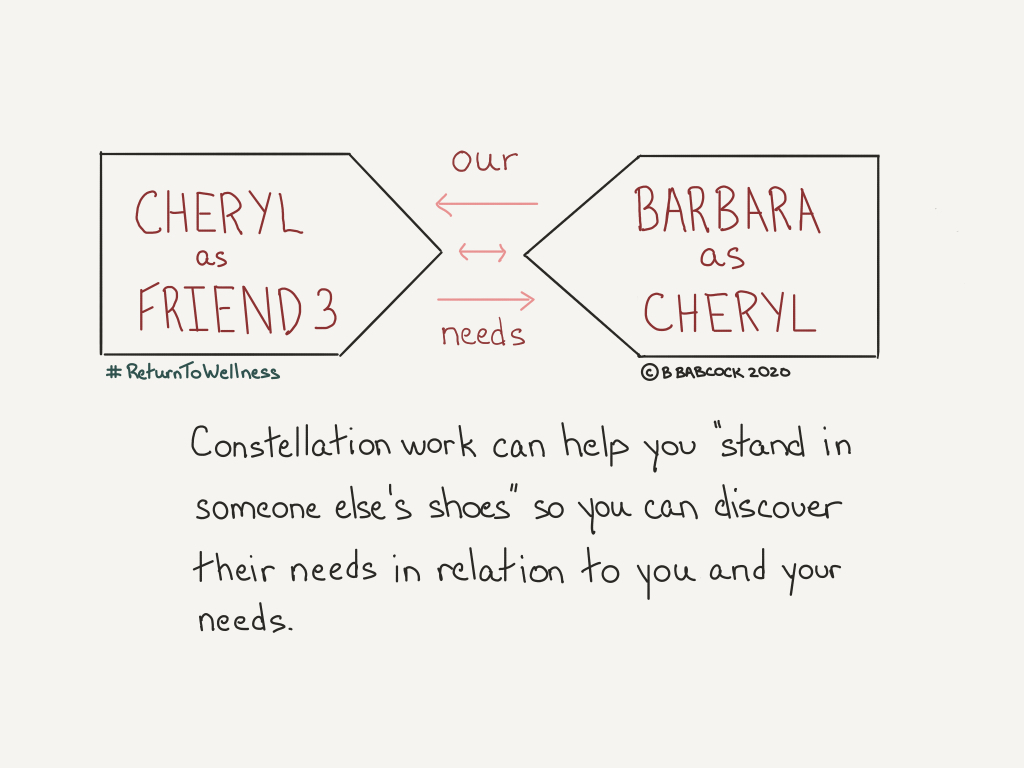
I asked Cheryl to sense into being her friend by what she noticed in her body, i.e. did Cheryl as her friend notice any physical sensations, images, questions or statements coming to her, or feeling a compulsion to move?
Standing in as her friend, Cheryl responded: ‘I don’t need you. You’re not sick anymore.’ She leaned back as she said that.
This constellation clarified for Cheryl that this friend in particular has a need to help others, and when a person no longer needs her help, this friend stands back from the relationship. Cheryl remembered that this friend has done this with others.
This constellation also demonstrated to Cheryl that how her friends are in relationship with her has more to do with them and their needs than her.
Cheryl had yet another important realisation. Although she feels sad at being excluded, she no longer considers the activities they once did together fun because they often centre around alcohol. She has other ideas of what a fun time with friends would be like and it no longer includes drinking lots of alcohol. This realisation lessened the sadness of being excluded.
Recognise that our needs in relationships will change over time
There are often changes to your friendships after cancer because your needs change. In Cheryl’s case, she said her friendships are like co-centric circles and her attitude to friendships has been to keep close friends in her inner circle and acquaintances in the next circle. But she realised these friends were now in the outer circle.
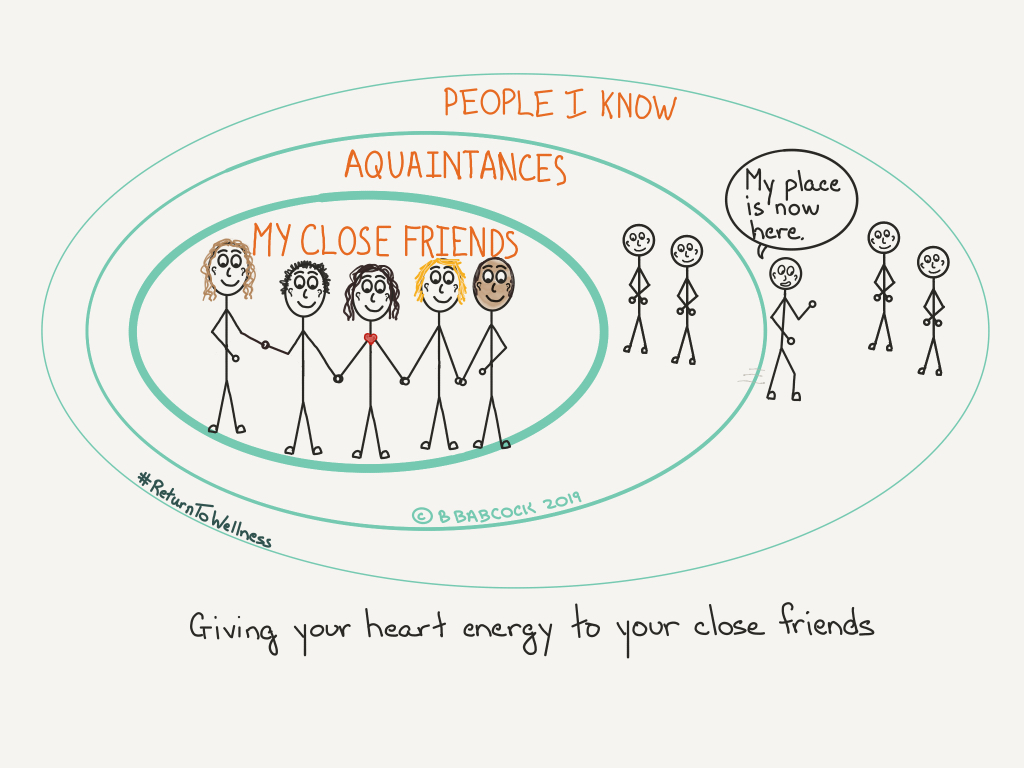
I asked Cheryl, ‘Has anyone taken their place in the inner circle.’
Cheryl described friends she had made during her cancer treatment and how she feels more ready to open herself to them. We used the analogy of opening our heart to our good friends, those friends in our inner circle. And that we may not open or give as much to people we know but who may not be as close. I re-iterated how this was owning one’s personal power and taking control and being aware of what one was giving (or not) in a relationship.
Cheryl commented that what attracted her to these women in the first place was the high level of confidence and self-esteem she thought they had. Cheryl said she wanted some of that for herself as she had historically perceived herself as not being worthy and lacking in self-esteem and confidence.
I explained to Cheryl that if you admire someone’s confidence and self-esteem, and are attracted to them because of it, that means you have confidence and self-esteem in you too. I shared the saying:
“If you’ve spot it, you’ve got it.”
This is what one of my tutors, a psychotherapist, once told me. This saying means that in order to spot something, you have to know what it is like. You know what it is like because it is in you too. It may only be a seedling, but it is a seedling you can nurture and grow.
Cheryl realised she had grown in confidence since she first met these women all those years ago. She had less need of being around their confidence. We also talked about how some of Cheryl’s recent accomplishments have increased her confidence.
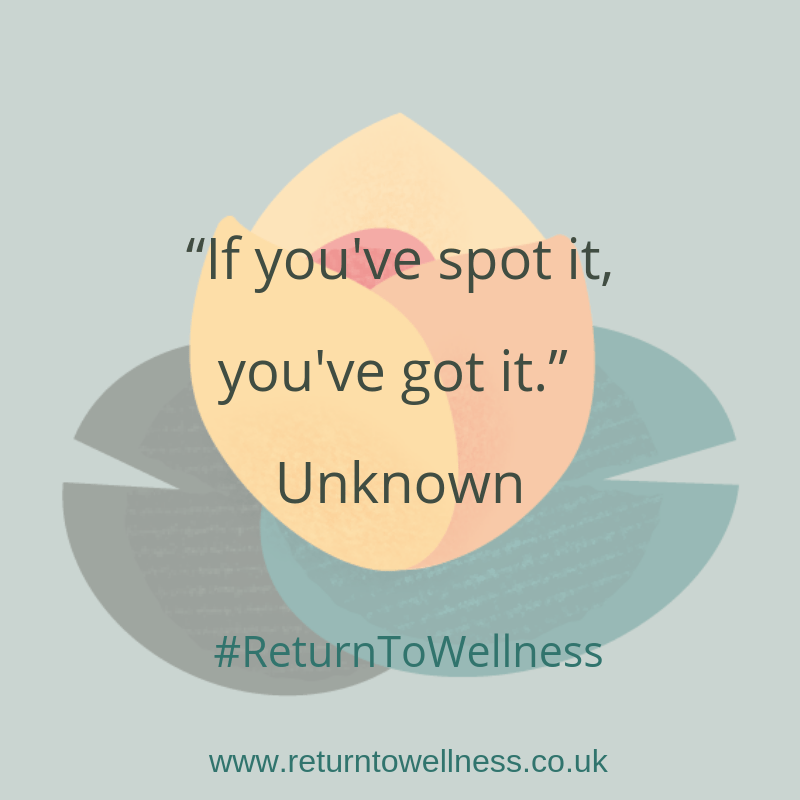
Your sources of self-worth are external AND internal
Linked to Cheryl’s self-confidence, we talked about how lovely it is to get compliments, praise and recognition from others but that we cannot only rely on that for our self-worth. We also have to compliment, praise and recognise ourselves for what we do, our accomplishments and importantly, for who we are as a person.
If we rely on others for compliments, praise, etc. for our self-worth, we could be waiting for a very long time for our self-worth to increase. It may never come because we can’t control what others do. This would be having an external locus of control in relation to your self-worth.
But we can control what we do, how we think and how we feel. So, it is up to us to provide ourselves with our own source of self-worth, which is inside every single one of us. We just have to sit with it and feed it.
Cheryl decided she would feed her self-worth by reviewing the three things that went well for her every day.
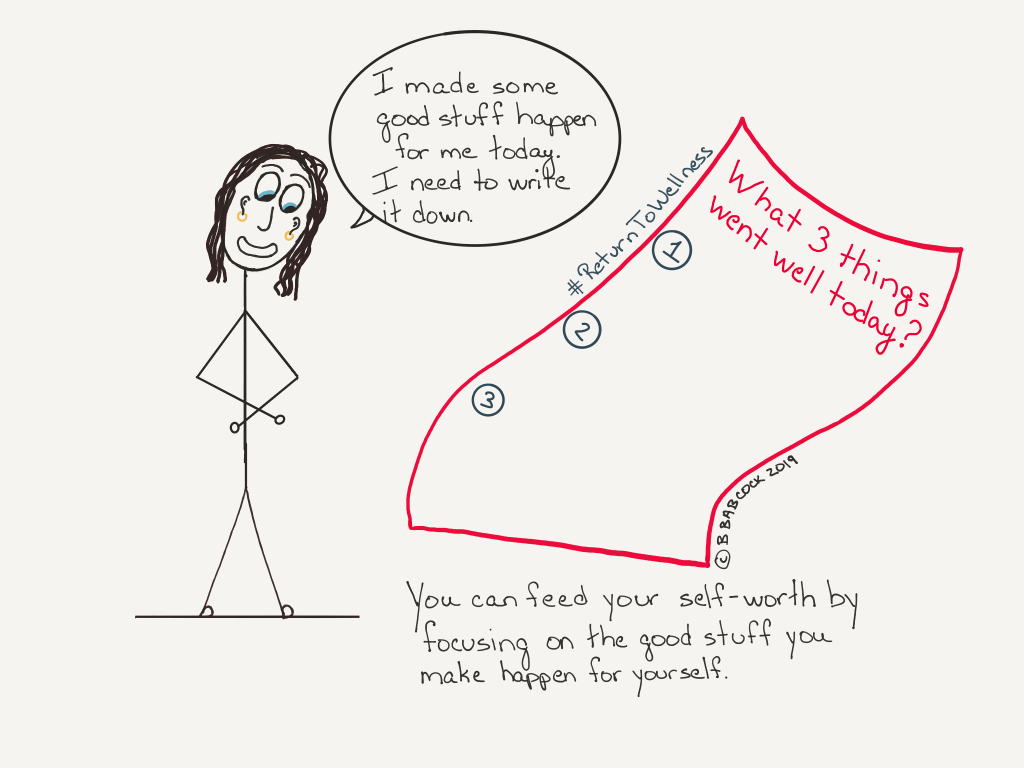
What’s it like for you?
What parts of Cheryl’s story resonate with you? What kind of changes to your friendships after cancer have you experienced?
References
Rotter, J. B. (1966). Generalized expectancies for internal versus external control of reinforcement. Psychological Monographs, 80 (Whole No. 609).
About the author
Barbara runs Return to Wellness. As a Health & Wellness Coach and Facilitator, she supports people recovering from illness or injury or coping with chronic illness, and their carers/supporters, to rebuild and renew their lives through coaching and programmes.
© Copyright Barbara Babcock 2019
Further information
Future Dreams hold a range of support groups, classes, workshops and events to help you and your carers during your breast cancer diagnosis. These are held both online and in person at the London-based Future Dreams House. To see what’s on offer and to book your place, see here.
To return to the homepage of our Information Hub, click here where you can access more helpful information, practical advice, personal stories and more.
Reviewed October 2023
The information and content provided in all guest articles is intended for information and educational purposes only and is not intended to substitute for professional medical advice. It is important that all personalised care decisions should be made by your medical team. Please contact your medical team for advice on anything covered in this article and/or in relation to your personal situation. Please note that unless otherwise stated, Future Dreams has no affiliation to the guest author of this article and he/she/they have not been paid to write this article. There may be alternative options/products/information available which we encourage you to research when making decisions about treatment and support. The content of this article was created by Barbara Babcock and we accept no responsibility for the accuracy or otherwise of the contents of this article.
Share

Support awareness research
Donate to those touched by BREAST cancer
Sylvie and Danielle began Future Dreams with just £100 in 2008. They believed nobody should face breast cancer alone. Their legacy lives on in Future Dreams House. We couldn’t continue to fund support services for those touched by breast cancer, raise awareness of breast cancer and promote early diagnosis and advance research into secondary breast cancer without your help. Please consider partnering with us or making a donation.
